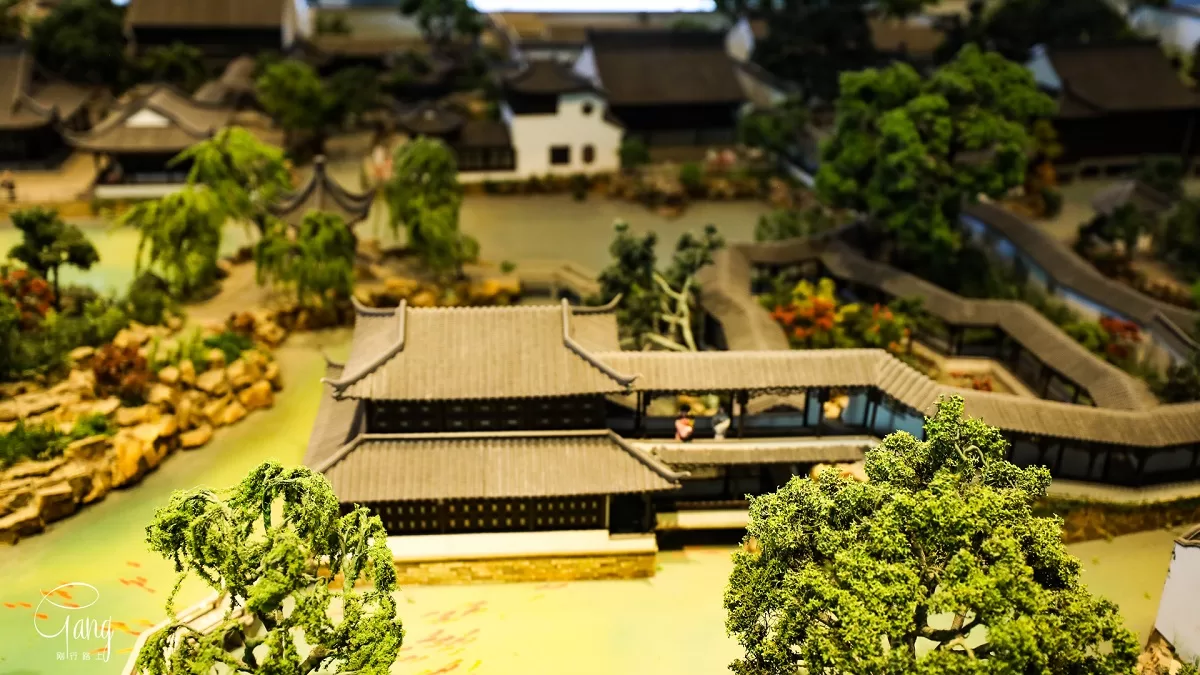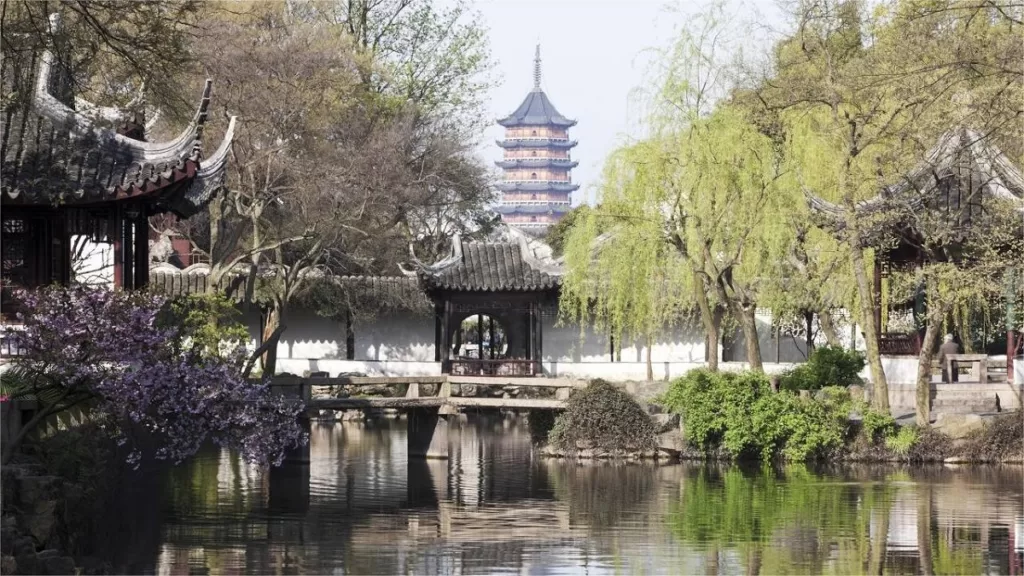The Suzhou Garden Museum (苏州园林博物馆), initially located within the confines of the Humble Administrator’s Garden, was inaugurated in the autumn of 1992, marking its distinction as China’s premier thematic garden museum. In a pivotal move on December 4, 2007, the museum transitioned to a new facility situated to the west of the Humble Administrator’s Garden, covering an expansive area of over 4,000 square meters and comprising five distinct exhibition halls.
Among these, the Garden History Hall stands as a vivid portrayal of history, beckoning visitors to transcend the confines of time and space as they traverse the developmental trajectory of Suzhou gardens. The Garden Delights Hall, in contrast, meticulously showcases a diverse array of elements, including Suzhou’s gardens that have been open to the public, renowned gardens from the six counties and cities surrounding Suzhou, as well as the remarkable allure of Suzhou-style gardens that are constructed abroad or still remain out of bond to the visitors.
The Garden Artistry Hall delves into the intricacies of Suzhou gardens, dissecting the “elements” and “artistry” that constitute their creation. Through a profound analysis, this hall unveils the reasons why Suzhou gardens have evolved into a distinguished system within the global realm of gardens.
For those yearning to delve into the essence and value of Suzhou gardens, a mere hour spent within the museum’s confines proves to be enriching. The Suzhou Garden Museum beckons individuals to explore the nuanced layers of Suzhou’s horticultural legacy, offering a comprehensive understanding of the artistry, history, and global significance embedded within these meticulously crafted landscapes.
Table of Contents
- Basic Information
- Location and Transportation
- Highlights of Suzhou Garden Museum
- Vlog about Suzhou Garden Museum
- Useful Tips Summarized from Reviews
- Attractions near Suzhou Garden Museum
Basic Information
| Estimated Length of Tour | 1 hour |
| Ticket Price | Included in the ticket of Humble Administrator’s Garden |
| Opening Hours | 9.00 – 16.30; Closed on Monday |
| Area | 3390 square meters, including four exhibition halls |
| Telephone Number | 0086-0512-962015 |
Location and Transportation
Situated in close proximity to the famous Humble Administrator’s Garden and other iconic Suzhou landmarks, Suzhou Garden Museum is ideally positioned to offer visitors a comprehensive experience of the city’s renowned garden culture. Its exact address is No. 178, Northeast Street, Gusu District, Suzhou, Jiangsu Province, China. To get there, you can choose the following ways:
Bus: Take bus 5, 9009, 9016, 9025, or 9029, get off at Suzhou Museum Stop (苏州博物馆站), and walk about 300 meters to the northeast to reach the museum.
Metro: The nearest metro station to Suzhou Garden Museum is North Temple Pagoda (北寺塔 Beisita). After getting out of the station from Exit 4, walk about 1 kilometer to the east to reach the museum.
Highlights of Suzhou Garden Museum
Diverse Garden Styles

The Suzhou Garden Museum gracefully exhibits a rich tapestry of diverse garden styles, each a masterpiece in itself. From the tranquil simplicity of the “Yi Yuan Garden” to the intricate elegance of the “Cai Yuan Garden,” and the timeless charm of the “Liuyuan Garden,” visitors traverse an aesthetic journey through history. The museum’s curated landscapes capture the essence of classical Chinese garden philosophies, presenting an enchanting blend of nature, symbolism, and architectural craftsmanship. These distinct styles epitomize Suzhou’s renowned garden heritage, inviting contemplation and offering insights into China’s cultural evolution.
Symbolism and Meaning

The Suzhou Garden Museum is a symphony of symbolism, where every stone, plant, and structure resonates with profound meaning. Water represents life’s flow, while rocks symbolize strength amid change. Bridges embody connection, and pavilions evoke reflection. The carefully orchestrated design echoes Daoist and Confucian ideals of harmony, balance, and unity with nature. Amidst tranquil ponds and meandering paths, the garden’s intricate layout signifies a microcosm of the universe. Each element embodies cultural values, spiritual depth, and aesthetic purpose, inviting visitors to delve into the intricate layers of Chinese heritage and philosophy while immersing themselves in a serene and contemplative realm.
Cultural Significance

At the Suzhou Garden Museum, cultural significance flourishes amidst nature’s beauty. Each garden is a canvas painted with historical narratives, embodying ancient Chinese beliefs, traditions, and values. The museum is a living testament to the profound connection between art, spirituality, and daily life. It reflects China’s rich cultural heritage, showcasing the intricate interplay of philosophy, architecture, and horticulture. As visitors wander through the serene landscapes, they gain a deep understanding of the past’s imprint on the present.
Natural Retreat

Nestled in the heart of Suzhou, the Garden Museum stands as a serene natural retreat, a sanctuary from urban clamor. Amidst tranquil ponds, lush foliage, and delicate architecture, it offers respite for the weary soul. The museum’s landscapes cocoon visitors in a harmonious embrace, soothing senses with the gentle cadence of flowing water and rustling leaves. Here, bustling city life dissipates, replaced by a tranquil oasis where one can escape, unwind, and reconnect with nature’s soothing rhythm. The Suzhou Garden Museum beckons, a haven where time slows, worries fade, and the spirit finds solace in the symphony of nature’s embrace.
Vlog about Suzhou Garden Museum
Useful Tips Summarized from Reviews
Model Exhibits: Upon entering, you’ll encounter two model exhibits. One represents a section of the Summer Palace (颐和园), and the other represents the Wangshi Garden (网师园). The comparison between the two models is striking, showcasing the distinction between imperial gardens and private gardens.
Museum Location and Architecture: The Suzhou Garden Museum is housed in the residential part of the original Zhuozheng Garden. The building itself was initially a part of the garden, emphasizing that the museum is, in essence, a garden.
Summer Weather Caution: If visiting during summer, be prepared for intense sunlight. Ensure you are adequately protected from the sun by wearing sunscreen, a hat, and light clothing. Stay hydrated and take breaks in shaded areas when needed.















Before visiting the Humble Administrator’s Garden, I recommend visiting the nearby Suzhou Museum!! The Suzhou Museum, Suzhou Garden Museum, and the Humble Administrator’s Garden are all very close to each other, just a few steps away. The Suzhou Museum is hard to make reservations for, but the Suzhou Garden Museum is easier to book. You can easily make a reservation at the entrance and enter directly. It’s also free because many people are not aware of this place, so it… Read more »